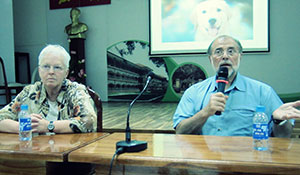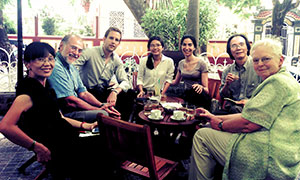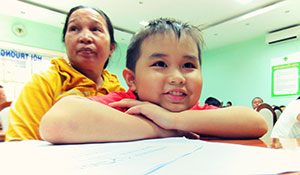

Joining Forces for Healthy Kidneys
An Educational Journey in Vietnam
An Educational Journey in Vietnam
Chronic kidney disease (CKD) represents a major public health burden for children worldwide, and can lead to high morbidity if not managed properly. It is of particular concern in resource-poor nations, where governments and humanitarian organizations often overlook CKD and other chronic, non-communicable diseases. As a result, local communities may lack sufficient medical resources and specialized health professionals to adequately care for affected children.
Second-year medical students Azadeh Issapour and David Cisewski were able to participate firsthand in an effort to address this issue in Vietnam with support from Einstein’s Global Health Center.

Dr. Kaskel discusses CKD during a continuing medical education course offeringMs. Issapour and Mr. Cisewski learned of the overseas opportunity from Dr. Frederick Kaskel during the final case conference session of their first-year renal systems course. Dr. Kaskel, professor of pediatrics at Einstein and chief of pediatric nephrology at Einstein’s University Hospital, Montefiore Medical Center, serves on the scientific advisory board member of NephCure Kidney International, an organization whose goals include establishing a nephrotic disease registry in Vietnam that will allow physicians to track, diagnose, treat and prevent kidney diseases whose causes are not clearly known.
Joining Forces to Address a Need
NephCure teamed with Caring & Living As Neighbours (CLAN), an Australian nonprofit that specializes in medical outreach and education in developing countries, to tackle their common goal of improving the lives of children living with chronic health conditions. They put together an educational team to work with physicians in Vietnam, so that they can better address the problem in their nation. Dr. Kaskel was among the team of pediatric nephrologists assembled for the project. He, in turn, recruited the two Einstein students to assist with NephCure’s registry project.
"Though neither of us had experience working with children with kidney diseases, we were eager to apply our new knowledge to a clinical setting, so we jumped at the opportunity," said Mr. Cisewski. "Within three weeks of learning about the project, with assistance from Dr. Kaskel and Jill Raufman in Einstein’s Global Health Center, we were fully vaccinated and on an 18-hour flight to Ho Chi Minh City, Vietnam."
The duo embarked on their journey along with Dr. Kaskel, and were joined by Drs. Elisabeth Hodson and Kate Armstrong of CLAN; renal pathologist and Vietnam native Dr. Luan Truong of Houston Methodist Hospital System;and Henry Brehm, of NephCure. Over the span of three weeks, the team visited several hospitals in Vietnam, sharing knowledge and social support regarding CKDs and treatment with local physicians, medical residents and family members of affected children.
Focusing on Education & Community

(From left): Dr. Chi Nguyendiem, Dr. Frederick Kaskel, David Cisewski, Dr. Hong Duc, Azadeh Issapour, Dr. Luan Truong and
Dr. Elisabeth Hodson At each hospital they visited—Hue Central Hospital, Children's Hospital 1 and 2, in Ho Chi Minh City; and Thai Binh Community Hospital—the team offered continuing medical education sessions for local hospital physicians and medical residents in which they discussed the biology, pathology and treatments for CKD. They also held support group meetings called “club sessions,” which were a core component of the program that provided a supportive environment for family members to ask questions and discuss their childrens’ experiences with CKD.
"While the program’s primary goal is to educate the local hospital staff members about childhood kidney diseases and its treatment, care and relapse, both representatives from CLAN and NephCure each emphasized the importance of including families and the greater community in the discussion as well," noted Ms. Issapour. "The club sessions provided that forum."
"Engaging the community and relationship-building are important components of each organization's approach to improving the quality of life of affected children and their families," added Mr. Cisewski. "They realize that it's crucial to empower families and to encourage them to be actively involved, so they can better care for their children."
Sharing Lessons Learned
Upon their return, Dr. Kaskel, Ms. Issapour, and Mr. Cisewski attended the 65th annual United Nations Conference for Non-Governmental Organizations, held at UN headquarters.

A youngster listens intently at a meeting of a local nephrotic clubThey took part in a workshop moderated by Dr. Armstrong, who is founder and president of CLAN. Participants talked about non-communicable diseases (NCDs) and strategies for garnering greater awareness about these public health issues. The workshop featured a panel of speakers from different regions of the world, each of whom described their own experience of either having an NCD or working with children who battle NCDs in resource-poor populations.
"This opportunity to travel as part of an international, medical/educational advocacy team was truly unique," noted Dr. Kaskel. "We all gained an appreciation of the challenges involved with developing communication networks in another country, and we learned to appreciate the unifying force of mutual commitment"
"The whole experience—the trip and taking part in the coference—was enriching and life-changing," said Ms. Issapour. “It was sobering to see children who were suffering from the diseases we had learned about in class. And we gained mentors who are experts and pioneers in the effort to address CKD in Vietnam and other developing countries."
Posted on: Monday, March 9, 2015


